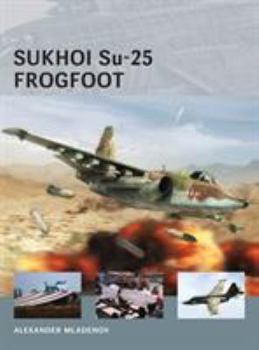Sukhoi Su-25 Frogfoot
(Book #9 in the Air Vanguard Series)
Like the American A-10 Warthog, the first Soviet jet dedicated by design to CAS (Close Air Support), the 'Frogfoot' has durability and firepower.
In February 2012, the Sukhoi Su-25 (NATO reporting name Frogfoot) celebrated 37 years of its maiden flight, 31 years of its formal induction into squadron service and 25 years of its formal entry into service with the Soviet Air Force. It was the Soviet Air Force's first mass-produced jet purposely designed for the Close Air Support (CAS) role and is a simple, effective and durable attack workhorse that, by 2012, had seen combat in no fewer than 40 conflicts. The Su-25 received its baptism of fire five years after its maiden flight, during Operation Romb in Afghanistan in 1980. This operation saw the new aircraft go through its field evaluation and testing in real-world war conditions. As many as 630 Su-25 Frogfoot-As were built between 1979 and 1991 at the Georgia-based aircraft plant now known as TAM (Tbilisi Aircraft Manufacturing) for the Soviet Air Force, as well as 185 Su-25Ks for export, while no fewer than 70 Su-25UB/UBK Frogfoot-B two-seaters rolled off the production line at the aviation plant in Ulan Ude (UUAP), Russia. Currently, there are plans to resume production of the two-seater variant with state-of-the-art avionics and the latest weaponry to replace those Su-25s dating from the mid/late 1980s that are still in service. The Frogfoot is known as the most cost-effective ground attack aircraft available to the Russian Air Force (RuAF) and, between the RuAF and the Russian Navy's aviation assets, there are some 200-220 Su-25s still in operation today, though only half of that number is airworthy at any one time. As with many Soviet designs, the Su-25 has been widely exported, with 25 nations operating variants of the Frogfoot at one time or another, and it remains in service 19 of these states - a testament to its effectiveness and reliability.Format:Paperback
Language:English
ISBN:1782003592
ISBN13:9781782003595
Release Date:September 2013
Publisher:Osprey Publishing (UK)
Length:64 Pages
Weight:0.45 lbs.
Dimensions:0.2" x 7.1" x 9.7"
Related Subjects
HistoryCustomer Reviews
0 rating





